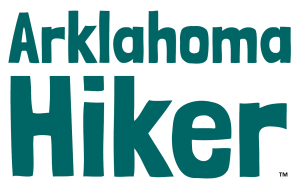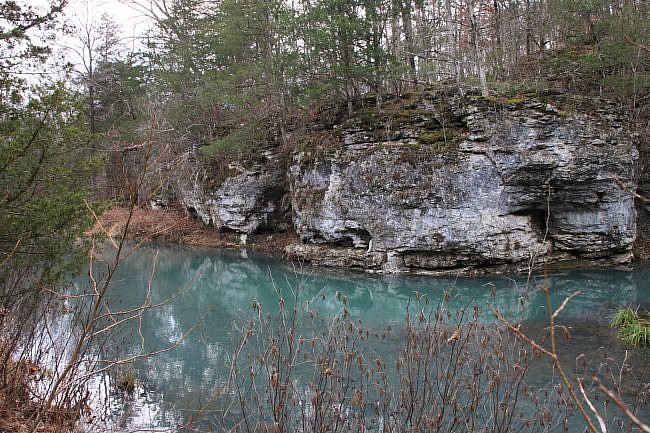
[Note: As of 5-27-2021, part of the Cecil Cove Trail is closed. Check ahead with the National Park Service for the latest status.]
The former community of Erbie (north Newton County, Buffalo National River) offers a variety of hiking trails that can be combined for larger or shorter loops. Because it was a community, many of the trails feature historical sites that tell a story of early settlers to the area.
The 6.4-mile Cecil Cove Trail Loop, much of which follows Cecil Creek, is one of these. It provides a wonderful assortment of spring-fed ponds, streams, historic stone walls, a historic cemetery, former home sites, and a spur trail that leads to a couple of awesome waterfalls.
This is a full day of nature and historic sites that is well worth the trip. The trail is also shared by horses.
The elevation change on the hike is about 850 feet
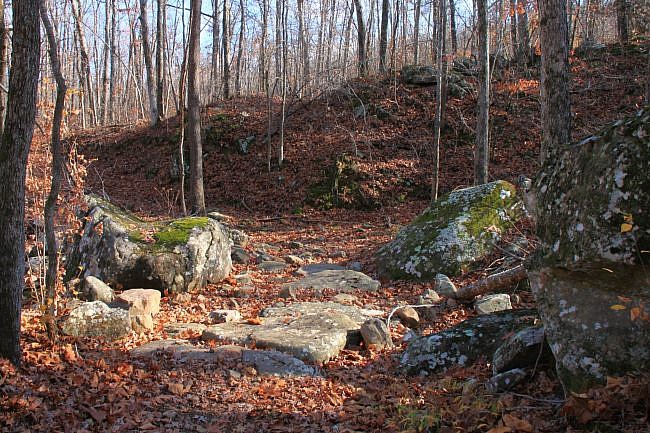
Getting to the Erbie Trailhead
The trailhead is in the community of Erbie—just north of Erbie Church.
The simplest way to get to the Erbie trailhead is by taking the Erbie Campground Road from Highway 7 (just South of Pruitt). This road takes you past the Koen Interpretive Trail, the Ponds Loop, the Erbie Campground, and the Parker Hickman Homestead. Eventually, it crosses a low-water bridge over the Buffalo River before heading north to the Erbie Church.
Caution: During high water, the low-water bridge will not be passable. Do not attempt to cross flowing water in your vehicle.
The other two ways to get here are via the road from Compton that runs past the Compton Trailhead. This is a 4-wheel-drive only road past the trailheads. It is very rough.
The most consistently drivable route requires coming in from Marble Falls off Highway 7, just north of the former Dogpatch location. This route is long and mostly gravel, but it is usually drivable.
Park at the trailhead just north of the Church. The Cecil Cove Trail starts just north of this parking area by the pit toilet.
Hiking Cecil Cove Trail Loop
The trail starts off on what appears to be an old road trace and heads into the woods and gradually down a hill.
At about .2, the trail gets pretty steep. At .3, you run into a small pond. This area is formed by Van Dyke Spring (which comes out of the small bluff on your left just upstream a little) and some help from the local beaver population who have dammed up this stream. This is a beautiful area.
It is also the first of two pretty challenging water crossings.
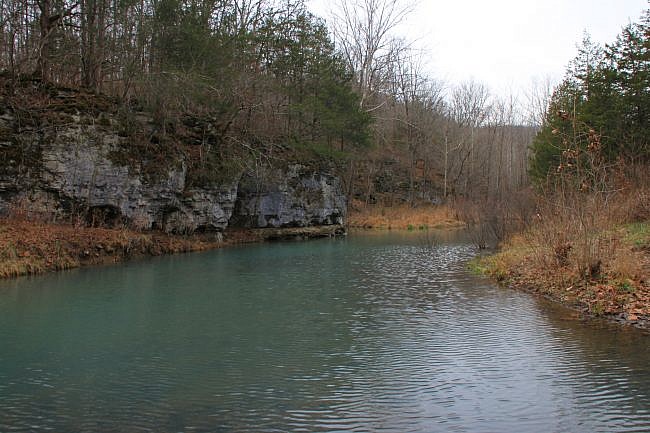
There is not really a good way to cross here (unless you’re on horseback), but if you go to the right (downstream) you can often find a combination of rocks and logs to find your way across and keep your feet dry. When the water levels are high, it is probably best to just assume this will be a wet crossing and plan on getting your feet wet.
After the first water crossing, do not cross the second stream. Instead, turn left and cross a few more rocks where the water from the pond area is flowing into the other stream. (This should be a fairly easy crossing.) You then end up in a middle island area between the pond and the creek. You can pick up the trail here.
The trail stays on the level and runs along the edge of the pond you just crossed. The pond and the bluff opposite create a beautiful area to hike along.
At about 1.0 miles, the trail crosses the creek that has been running to your right. When the water is high, this is a tough little crossing. (It appears to be much easier on a horse.)
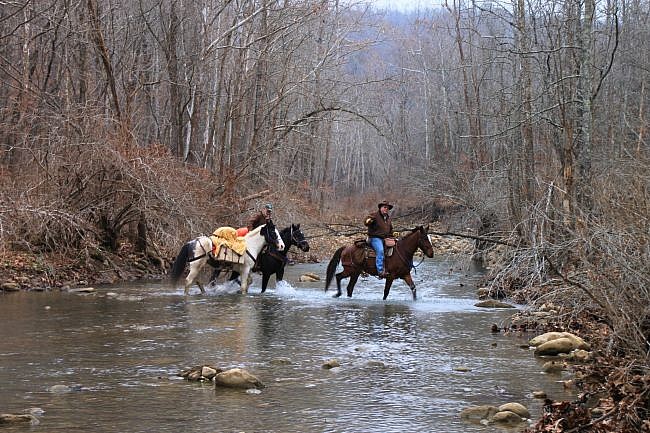
But as with the other crossing, if you go downstream a bit, there are a bunch of rocks that may permit a dry crossing. (I highly recommend extra socks in cold weather in case your feet get wet.)
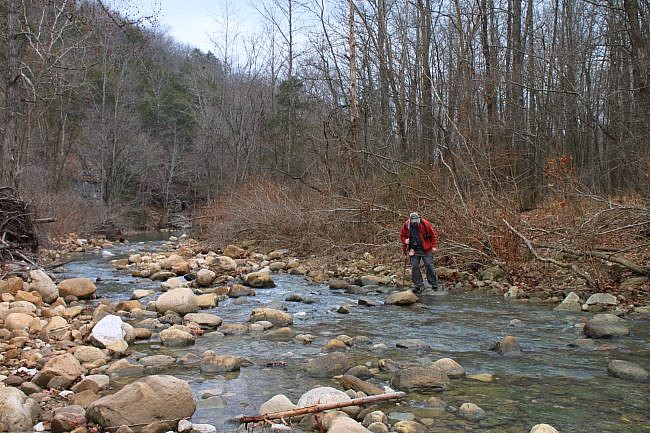
Once you cross the creek here, things get a little easier for a while . The trail follows on that side of Cecil Creek for a while. It is level here and runs through the woods and generally along the creek.
At 1.4 miles, the trail crosses the creek again. At this point, the creek runs underground, so this is a dry crossing.
Once you cross the creek, the trail turns right and follows along the creek bed for a bit. At 1.8, it crosses the creek again (another dry crossing) and follows on the level again.
At 2.0, the trail passes an old stone wall. This is the first of many historic things you will see along this trail. It is a well-constructed stone wall and is, in its own right, very scenic.
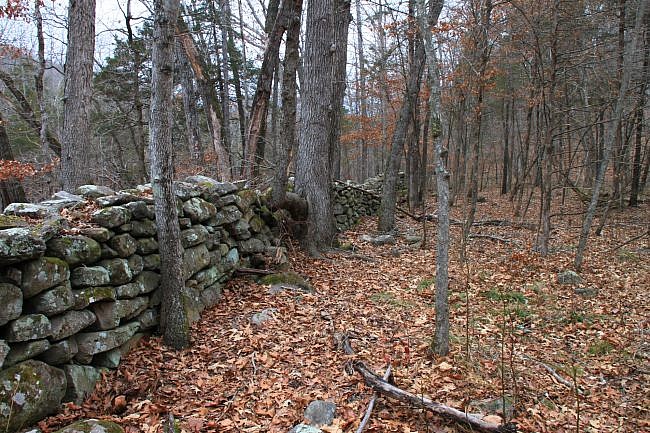
Just past the wall, the trail crosses the creek one last time and begins to climb the hill on the other side. At 2.2 (just a short walk up the hill), you will get to an intersection. To complete the loop, you will continue straight.
(There is a spur trail to the right that heads back to a great camp site and two amazing waterfalls. You can read about this spur trail here.)
To continue on the Cecil Cove Trail continue on the trail that veers to the left and head up the hill. This part of the trail follows an old road trace and is a pretty steep climb with about 400 feet of elevation gain.
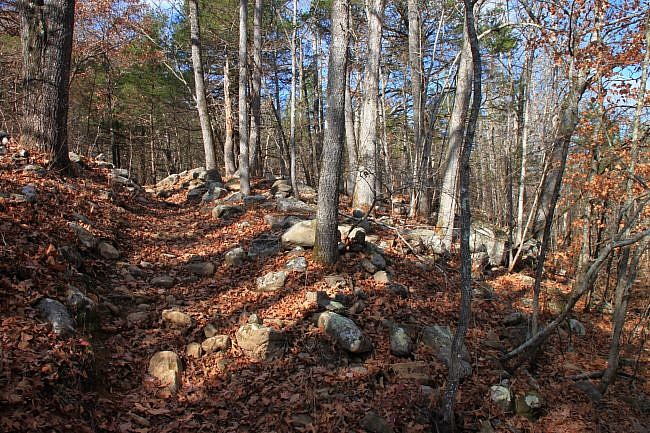
At 2.7 miles, you reach Jones Cemetery.
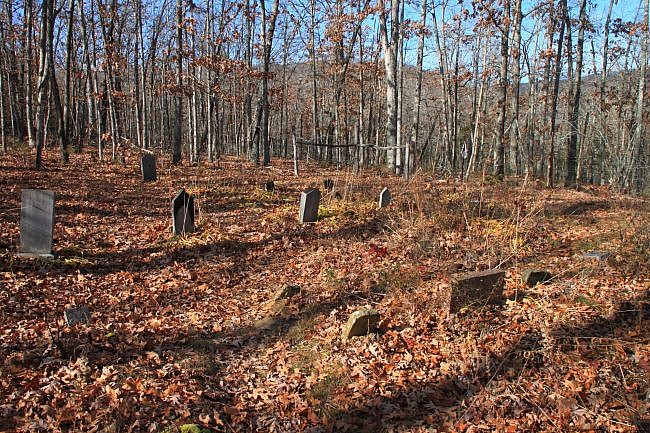
Jones Cemetery is one of many old, abandoned cemeteries that are on trails along the Buffalo. And like the others, reading the tombstones can give you a feel for how difficult life was in this area in at the turn of the last century.
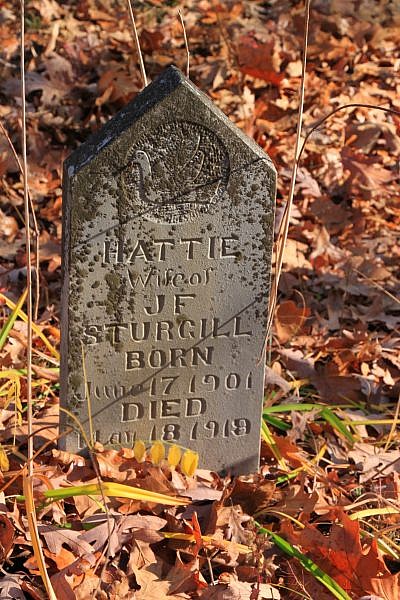
Many of the tombstones are of young women and infants that died during child birth. It was a tough time—and really, not all that long ago.
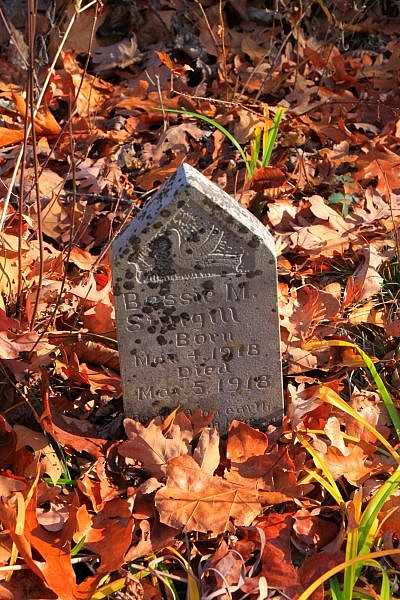
After exploring the cemetery for a while, continue on the trail. At 2.9, you will see an old homestead. There isn’t much left of it except for a foundation and an old fireplace and chimney. This is the former homesite of William Jones. His tombstone is in the cemetery you just passed.
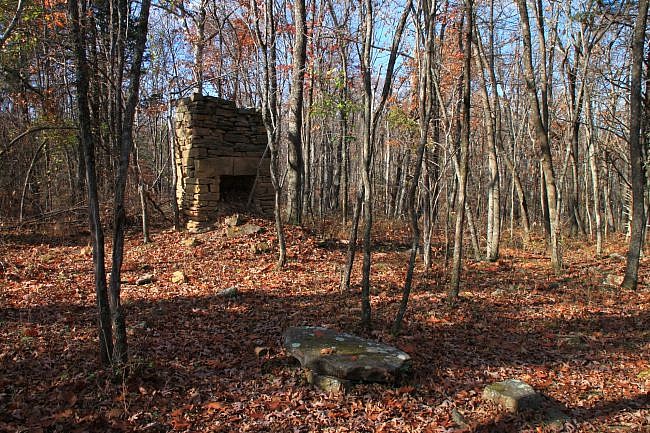
From here, the trail turns sharply left and continues out on the level. Soon you will pass a stone wall on your right. This is the Faddis-Keaton Homesite.
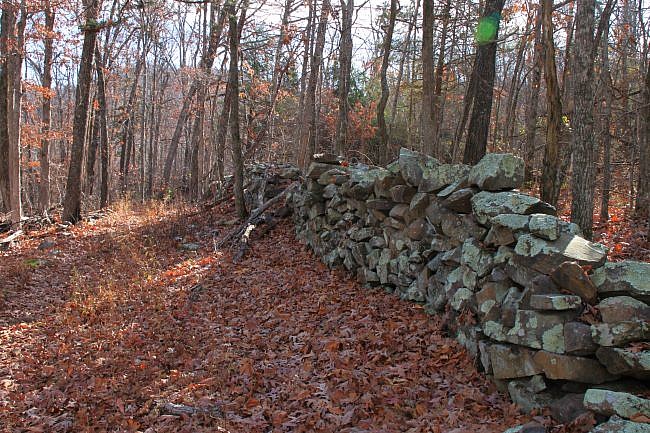
The trail here continues and follows an old road that would have joined the several home sites that you have passed (or will soon pass) to the cemetery and to the church that once existed at the bottom of the hill.
The road follows a bench along the bluff line and is great hiking.
During leaf-off, you can see a lot of scenic views to your left and a lot of areas with large boulders.
During wet season, a lot of these rocky areas become really interesting with small waterfalls and water displays.
The trail will pass another homesite. This one includes a spring that is protected by rocks. This would have been a great source of water for the early settlers.
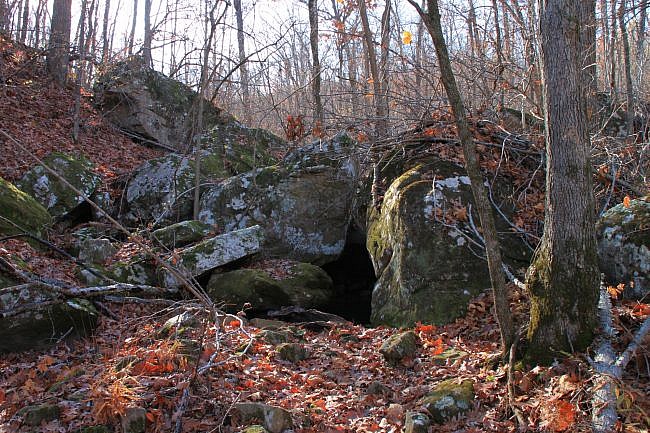
The trail continues along the bench. There is a steep bluff to your right and a steep downhill area to your left. Enjoy the views—and the trail.
At about 5 miles, a bluff line will begin to form on your right. At the top of that bluff is McFarrin Point. To your left are more views.
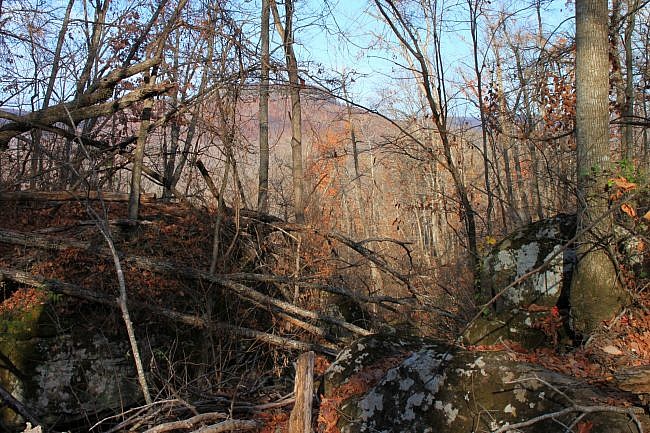
At 5.2, the trail connects with the road that runs from Compton to Erbie. Turn left on this road to complete the loop back to the Erbie Trailhead.
(For a longer hike, you can go about 800 feet and turn to the right heading back into the woods. The trail goes down to the J. W. Farmer Homestead and then connects with the end of the Goat Bluff Trail before turning back to Erbie.)
It is about 1.2 miles back to the Erbie Trailhead. The road is not often used and is actually a very nice hike.
Once you are back at the trailhead, the hike length has been about 6.4 miles.
Final Notes
The mileage distances are from Tim Ernst’s Buffalo River Hiking Trails.
I rate the difficulty as “strenuous” (4 of 5) due to distance, water crossings, and elevation change (850 feet).
For footwear, I recommend sturdy hiking boots. You may also want to take a pair of water shoes for wet water crossings.
These photos are from hikes I made on November 23, 2010 and December 29, 2013.
Photo Gallery
Click below for full-screen photo gallery.
Map
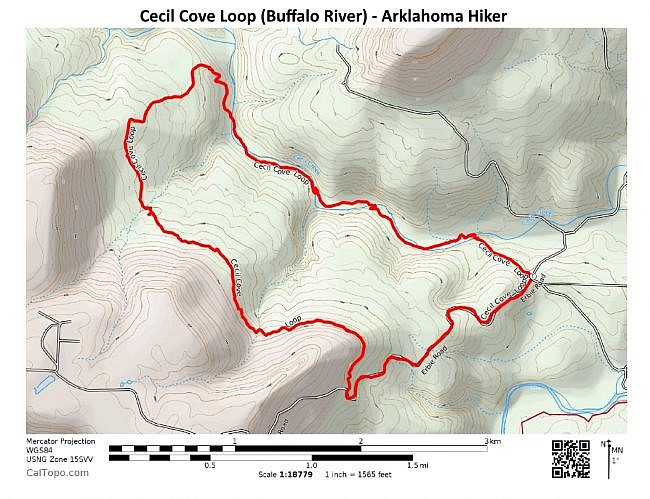
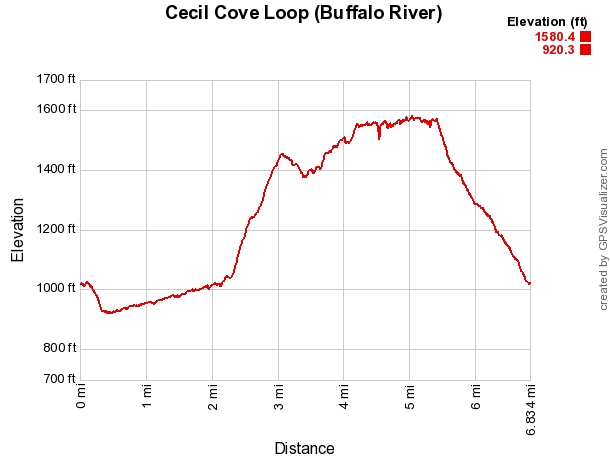
These maps and the elevation profile are based on Patrick Caple’s gpx file. His Cecil Cove Trail post at “No Trail Required” is here.
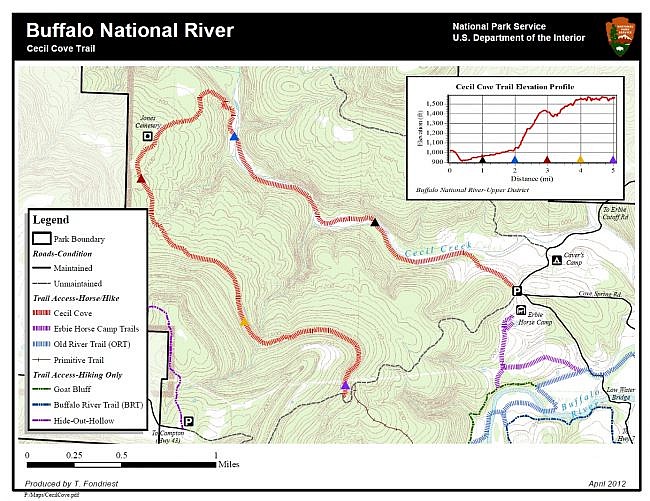
Cecil Cove Trail Loop (Buffalo River) |
|
|---|---|
| Location | Buffalo National River near Erbie, Newton County, Arkansas |
| Length/Type | Approximately 6.4 mile loop including 1.2 mile walk along road. |
| Difficulty | Strenuous (4 of 5) |
| Gpx file (by Patrick Caple of "No Trail Required") | Link |
| Date Hiked | November 23, 2010 |
| Directions. (See above also.) | Google Maps Directions to Erbie Trailhead (Watch road conditions.) |
| Official Info | (870) 439-2502 (Tyler Bend Visitor Center Information) Website NPS Trail Map (pdf) |
[A version of this post was originally published on April 1, 2014 in the blog “Exploring Northwest Arkansas.”]
Last revised: 5-27-2021.
